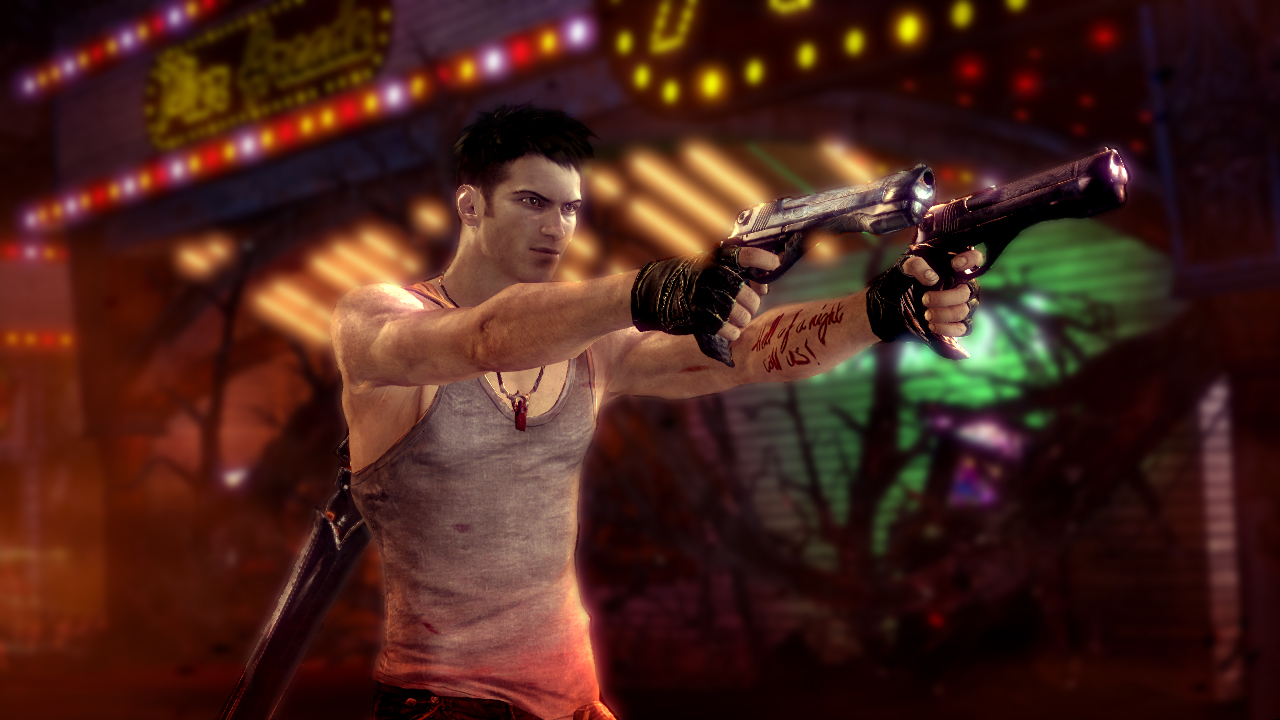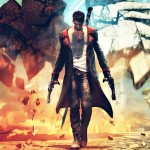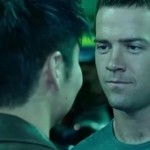This review is a bit late, yes. Although it was because, in truth, I simply can't stop playing this game.
As I said in my demo impressions a couple months back, there has been no shortage of controversy surrounding Capcom's reboot of their groundbreaking Stylish Hard Action series, Devil May Cry. A graphics engine that ran at 30 frames per second instead of 60. A reinterpretation of series protagonist Dante from a smarmy smartass to someone that, at first glance, came across as significantly more juvenile and "emo." A seemingly shallower combat engine. In short, developer Ninja Theory (to whom Capcom had farmed out the bulk of development to) had to prove themselves big time with this venture, at least as far as longtime fans were concerned.
Could they? Would they?
The answer, coming from a longtime veteran and massive fan of the series, is a resounding "Yes." Although not without some caveats.
Look, let's face it, whether we got a "true" Devil May Cry sequel (with a "5" in the title) or this reboot, the game was going to be significantly different than any of its predecessors. That's just how the series has been since it was first sequelized. Yes, the fundamentals have remained in place, but each new entry has done radical and significant things to the gameplay that make it notably different in key areas. DmC is no different.
The most immediately noticeable difference is in the visual palette. The series has never had a unified visual design, going from moody gothic themes in the first all the way to a very generic mix of environments the fourth. DmC keeps things mostly urban, but in a way I've truly never seen before. The main hook of DmC is that Dante is continually pulled into a pocket realm called Limbo where he is forced to combat demons and where the truth of their existence is hidden from the rest of humanity. It is in Limbo that you'll not only spend the majority of the game fighting, but also uncovering the truth of the demons' enslavement of humanity via subversive and sinister methods, not unlike in the John Carpenter cult classic, They Live.
Simply put, Limbo is stunning. Even when at its most demonically twisted, the artists at Ninja Theory have crafted some of the most visually exciting and interesting environments I've perhaps ever seen in a video game. Each location twists and shifts, crumbles and morphs, all in real time and almost always in an effort to either impede Dante's progress, or at times to even outright kill him. The result is a surreal yet dangerous landscape that is prime real estate for laying the smackdown on wave after wave of demonic baddies.
Incredible as the vistas are, however, the real reason anyone plays a DMC game is for the combat, a facet Ninja Theory has clearly learned a lot about from this collaboration with Capcom. Complexity of combat has never been NT's strong suit, but there's certainly no denying they've brought a trick or two from their previous games (Heavenly Sword, to be precise) into the proceedings.
There's a larger focus on aerial combat and crowd control this time around. On the higher difficulties especially you'll find yourself constantly surrounded by all manner of twisted beasties and it will take the smart application of your entire arsenal to make it out alive. Thankfully, the tools provided are superb, with each one balanced well with little reason to favor one set over another. Creative weaponry has always been one of the series' most distinct calling cards and DmC is no different, though the armaments don't get nearly as wild as in previous entries. That said, unlike, say, DMC3 and 4, every weapon in DmC is easy to pick up and use and find creative applications for, making it easier to mix and match your entire arsenal on the fly. Some veterans will find that to be a mark against the game, but I like the ease of entry. It makes things immediately satisfying, but there's also plenty of depth to be had than at first glance.
Regardless, combat is as smooth and seamless as it's ever been with switching between devil arms an even more essential part of combat than before. With certain enemies requiring the use of either demon or angel weapons to do damage against them. This can be a hassle at times and actually highlights my only complaint with the combat. These color-coded enemies can make group encounters frustrating and even tedious, as your blows will be repelled should you not swing with the correspondingly-colored weapon, leaving you dangerously vulnerable. Thankfully, this can be circumvented thanks to tactical application of Dante's devil trigger ability, but it's still something I hope is either heavily modified or removed completely from future installments.
DMC veterans will most assuredly notice that the combat speed is a little slower (the result of the game being designed around running 30 frames per second on consoles), and the skill ceiling is also lower when it comes to pulling off certain moves and achieving that coveted SSS ranking from the combat style meter. Additionally, the difficulty is also considerably lower, even on the upper echelons of difficulty levels. The default "hard" mode (aka Nephilim difficulty) barely provides a challenge on-par with past games' "normal" mode, and even Dante Must Die mode here (typically a borderline nightmarish difficulty in past games) barely starts to scratch the surface of what past games would offer.
But in all honesty, I had a difficult time either marking that as a point against the game or even really finding a reason to care. Combat is simply sublime once you are fully armed, mixing up attacks and tactics on the fly. It's all so smooth and just flat-out fun in a way that I haven't really felt in previous entries. Which is saying something, since I consider DMC3 to have the best combat engine of any game ever made. (A sentiment that still stands, by the way, even if my personal preference places DmC in a higher spot.)
My point is that even though the combat runs at 30 frames per second and even though you have a somewhat smaller number of weapons at hand and even if the difficulty isn't what it should be, this is one of the finest-playing pure combat games to arrive in years. It plays marvelously, to the point where (as of this writing) I am on my third consecutive playthrough and have yet to even approach being tired of it.
So sublime combat may have come as something of a surprise given Ninja Theory's previous games, but what of the story? Writing and storytelling were the hallmarks of NT's last two efforts and almost assuredly one of the major reasons Capcom chose them for this venture. So how does DmC stack up? Against previous games it's probably "the best," although that's not saying much considering how laughably horrible the writing has been. Put up against NT's games it admittedly falls short, with far more focus being put on combat and gameplay than storytelling this time around.
The tale is a reboot and full-on reimagining of the Devil May Cry mythos. Dante and his twin brother, Vergil, are now the sons of a union between a demon lieutenant, Sparda, and his angel wife, Eva. (In the previous canon, Eva was a human.) Sparda led a rebellion against Mundus, who planned to enslave humanity. Upon learning of this, Mundus killed Eva and enslaved Sparda, but not before Sparda could hide the existence of his sons. As Nephilim (a hybrid of angel and demon), Dante and Vergil are humanity's last hope to break free from the tyrannical reign of this Demon King.
As our story opens, Dante is living a carefree, rebellious life, "fighting and getting laid." (As he so eloquently states.) It's when Kat comes knocking at his door that he soon finds he may have a greater purpose in life, as she implores him to join a group of freedom fighters known as "The Order." This group, led by Vergil, are the only faction of humans that know the truth about the demons' plans. Mundus, it turns out, has turned humanity into sheep, keeping them enslaved via poisoning of soft drinks, crippling debt and even a subversive, manipulative news media. Truth be told, it's all very on-the-nose and about as subtle as a bag of hammers to the face, but it's nice to see an action game at least try to fit some amount of social commentary and criticism into its proceedings. Did it need something like that? Not really, no, but it at least fits within the confines of the story being told and is admittedly an approach I've never seen taken in a game before.
The result is a story that is almost shockingly straightforward, but it gets the job done. That said, any fears fans had about NT giving us "Emo Dante" after that (admittedly awful) reveal trailer are wholly unfounded. Dante is still recognizably Dante, though his depiction and presentation are far, far less over-the-top than in previous games. (As is the presentation in general. No missile surfing for you, here.)
Our favorite demon hunter is still a smarmy smartass, though he's far more obnoxious and impetuous as opposed to the sort of cool, cocksure Dante we've had before. This depiction feels fitting, though, and comes across as a natural fit for a kid (and make no mistake, Dante is very much a kid in this, immature and inexperienced) who's spent his entire life being rebellious and borderline indestructible. His character evolves, though, somewhat, once he realizes the weight of what's at stake but also as he comes to realize the value of humanity (via Kat), but also his relationship with Vergil.
Dante and Vergil in the past mostly only felt like brothers in name only. Here, though their time together is limited, you actually get a sense of what these two would actually be like as a family unit. Which makes the fact that we get so relatively little of them together that much more frustrating. It takes almost no time for Dante and Vergil to begin bickering and swaggering and trying to one-up each other in the way brothers do, and it's a lot of fun to watch, making this relationship very much the high point of the game's writing.
I will say that I do miss the hilariously brash, gauche and absurd presentation and story of the previous games. (If it's wrong to love that bit in DMC3 where Dante uses a rocket-powered motorcycle as nunchucks, I don't wanna be right.) But I like the direction that Ninja Theory has taken with these characters and the world at large.
I'll just be honest here, I love this game. Love it. It's got a couple shortcomings here and there, but most of them either are inconsequential (the pistols, for instance, lack the punch they ought to have) or have mostly faded away as I've spent more and more time neck-deep in slicing demons. I would certainly welcome a return to "traditional" Devil May Cry, as that style and approach is still among the best ever crafted. But if Ninja Theory were to become the steward of the franchise for the foreseeable future, I would be just fine with that.
Now, if you'll excuse me, I have an angelic scythe to go plant inside a demon's skull.












